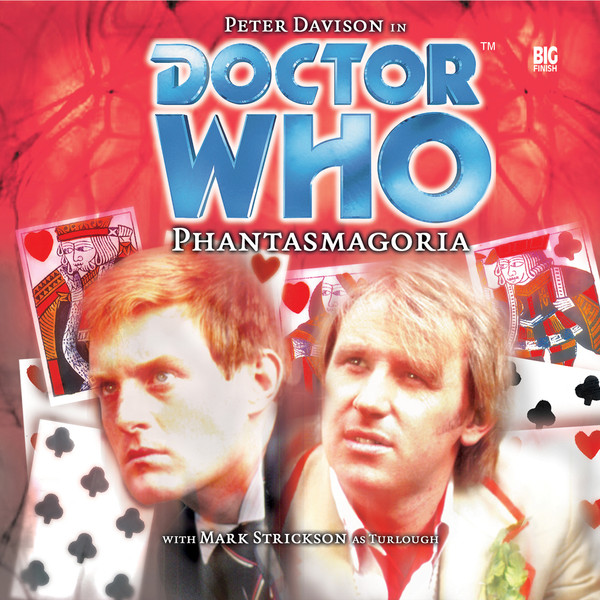
Released October 1999
‘Phantasmagoria’ is the second main release offering from Big Finish, a much more traditional affair after the mutli-Doctor tale that preceded it. Mark Strickson joins Peter Davison’s Fifth Doctor, marking the first televised companion to reprise his role. He may not be the most iconic of companions to be back first, but Strickson for the most part recaptures the essence of Turlough exceedingly well. The script gives him quite a bit to do directly, and although he doesn’t seem quite as reluctant to help as he did in the series nor quite as critical of the Doctor and his surroundings, he still displays some of the trademark sarcasm and snarkiness that is so unique to his character.
In 1702 London, the Doctor and Turlough quickly become embroiled in mysterious goings-on where a highwayman roams the streets, a local occultist has made contact with the dead, and men of good standing are disappearing. Big Finish already appears much more confident in setting the scene compared to the first release, and although there are still periodically some clunky dialogue scenes laden with exposition, everything flows quite efficiently and introduces the Diabola Club and the enigmatic Sir Nikolas Valentine who always seems to hold a winning hand in his game of chance.
Following a man dropping dead in the streets while holding a playing card, Turlough soon becomes separated from the Doctor, and this actually proves quite effective in allowing some deeper insight into the character while he conducts his own investigations into the cause of the ‘vanishments.’ At the same time the Doctor, with the help of antiquarian and occultist Samuel Holywell, also attempts to locate the missing persons. While Holywell seeks out any patterns with the disappearances, a series of numbers representing radio signals soon becomes the point of focus for the Doctor as he attempts to use the TARDIS to locate the source.
While the investigations inevitably lead all of the characters back to the Diabola Club, the sinister presence of Valentine is quite well written. Several scenes feature him playing his game of chance; avoiding the pitfall of many villains who describe their plan in detail to anyone who will listen, he instead lets out rare asides about restoration and how little time remains. This maintains the aura of mystery and tension, and creates a sense of unease as the Doctor decides to play Valentine in a game of cards. While it is no surprise that the Doctor walks away a victor, winning with the Ace of Hearts, Valentine later lets slip his desire for the Doctor’s mind to complete his work.
As with the final episode of ‘The Sirens of Time,’ events move at a blistering speed in the final episode of ‘Phantasmagoria.’ The Doctor’s discovery that the playing card is a tracking device tailored to an individual to steal that individual’s consciousness is a clever concept, and it explains why Valentine is always seen to be wearing gloves. Realizing that the can reprogram the card, the Doctor soon heads to Valentine’s lair for another confrontation. There he finds Turlough detained and, while Valentine’s reveal to be a murderous alien tyrant who needs the ‘spirits’ of his victims to power his bio-mechanical ship is perhaps less effective, it still neatly ties his motives and actions together. When Valentine refuses to face his execution on the planet of Deodalis and takes another captive, the Doctor uses some sleight of hand with his quick talking to turn the tables in quite an emotional scene.
‘Phantasmagoria’ suffers from some padding and pacing issues in the middle, but the plot is filled with several interesting concepts and characters, perhaps too many in some instancess. In particular, the Diabola Club is brought to life very well, its members displaying a good combination of eccentricity and extravagance to lend a sense of credibility and authenticity to this fictitious setting with its roots based in reality. Regrettably, David Ryall as Valentine is very much too over the top until the final scene, his performance undermining what really is a good script. Fortunately, Davison and Strickson recapture their characters very well and easily carry their scenes both when together and separated. The resolution feels earned and warranted, even if getting there means going through a gauntlet of new plot threads, but putting the Fifth Doctor into a historical setting with an intriguing sci-fi twist works exceedingly well as an entry point for the Doctor Who main range proper.
- Release Date: 10/1999


Leave a Reply